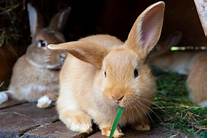How Long Do Rabbits Live For as Pets?
Rabbits are beloved companion animals known for their playful and affectionate nature as well as their longevities. Understanding the average lifespan of a pet rabbit and the factors influencing it can help you provide your furry little friend with the best possible care and quality of life.

Factors Affecting a Rabbit's Lifespan
1. Breed: Different rabbit breeds have varying lifespans. Generally, smaller breeds tend to have shorter lifespans (4-6 years), while medium and large breeds typically live longer (8-12 years).
2. Diet: Proper diet plays a crucial role in extending a rabbit's lifespan. Providing a balanced diet consisting of hay, fresh vegetables, pellets, and a limited amount of fruits treats can support their overall health and longevity.
3. Exercise: Regular exercise helps to keep rabbits active, healthy, and entertained. Exercise, such as playtime in a safe space or access to an exercise pen, can contribute to their physical and mental well-being, thus increasing their lifespan.
4. Housing: Providing a spacious, comfortable, and clean living environment is essential for a rabbit's longevity. A large enclosure allows them to move freely and engage in natural behaviors, while regular cleaning helps prevent infections and health issues.
5. Healthcare: Routine veterinary checkups, vaccinations, and prompt treatment of health conditions are crucial for a rabbit's long-term health and lifespan. Preventive care can help detect and address potential health problems early, improving their chances for a longer and healthier life.
Average Lifespan of Pet Rabbits
The average lifespan of a domesticated rabbit can range from 5 to 12 years, with an average of 8 to 10 years. However, certain breeds and individual rabbits may have longer or shorter lifespans. With proper care and attention, some rabbits have been known to live for up to 15 years or more.
How to Extend Your Rabbit's Lifespan
1. Provide a Healthy Diet: Feed your rabbit a balanced diet consisting of unlimited hay, fresh vegetables, and a controlled amount of pellets and treats. Fresh water should be available at all times.
2. Ensure Proper Exercise: Provide opportunities for your rabbit to exercise daily. Set up a safe play area in your home, and consider providing an outdoor exercise space during warm weather.
3. Maintain a Clean and Comfortable Environment: Regularly clean your rabbit's cage or hutch to prevent the buildup of waste and germs. Ensure the temperature and humidity are at optimal levels and provide adequate bedding or substrate for comfort.
4. Schedule Regular Veterinary Checkups: Take your rabbit for annual or biannual checkups to monitor their health and detect any potential issues early on. Vaccination against common rabbit diseases is also essential for preventing infections.
5. Provide Social Interaction: Rabbits are social animals and benefit from interaction with their owners and other rabbits. Playtime, grooming, and socialization can help reduce stress and enhance their overall well-being, contributing to a longer lifespan.
6. Handle Your Rabbit Gently: Avoid rough handling or excessive jostling, as rabbits can easily be frightened or injured. Always pick your rabbit up with support and avoid holding them upside down or by their ears.
By following these guidelines and providing your rabbit with love and attention, you can help promote their long-term health and increase their chances of enjoying a long and happy life.
Declaration: All article resources on this website, unless otherwise specified or labeled, are collected from online resources. If the content on this website infringes on the legitimate rights and interests of the original author, you can contact this website to delete it.





